'Gives me purpose': These activities are bringing seniors and toddlers together to form friendships and bonds across ages
SINGAPORE — As Mr See Keng Soy, 79, was explaining to a group of two-year-olds about the lifecycle of a long bean, a curious child asked him whether the long bean or the seed came first.
The former vegetable seller smiled happily as he entertained this and other eager questions during one of the many inter-generational activities around Singapore encouraging seniors to spend time with children.
Mr See is part of a group of seniors at NTUC Health Senior Day Care in Boon Lay who signed up to spend time with the kindergarten children at the nearby My First Skool twice a month.
"It gives me some purpose... I feel useful and I'm happy to teach the kids," he said.
Some days, the children go over to perform for them. Other days, the seniors practise for days before reading the children a storybook. They also have a shared garden, where old and young plant and water vegetables together.
Over at Joo Chiat, the seven residents at Joo Chiat Social Club have taken two-year-old Faith Lee as their "granddaughter", alongside the other children of the volunteers helping out at the assisted living centre.
Whenever the youngster is at the shophouse, run by her parents — Ms Mariel Chee and Mr Bennett Lee — the elders spend time with their daughter, sometimes helping to feed or entertain her.
Ms Chee told TODAY: "As she learnt to interact with the seniors, she realised she has to walk slower when holding their hand, or not hit them because they are more frail.
"The interaction between the kids and the seniors are all organic and not structured. It's like a kampung (village) where everyone benefits from each other's company... they treat her like their granddaughter."
Joo Chiat Social Club has been operating for a year now.
As for the group in Boon Lay, it has been 10 years since NTUC Health and NTUC First Campus, which runs My First Skool, piloted its inter-generational programme.
They are just two of many organisations here running activities that involve multiple generations, rather than targeting one or the other.
Several seniors said that the programmes give them a sense of purpose and make them "feel young again". The children also benefit from the interaction, parents told TODAY, as the young ones develop their emotional intelligence and learn how to interact with the older adults.
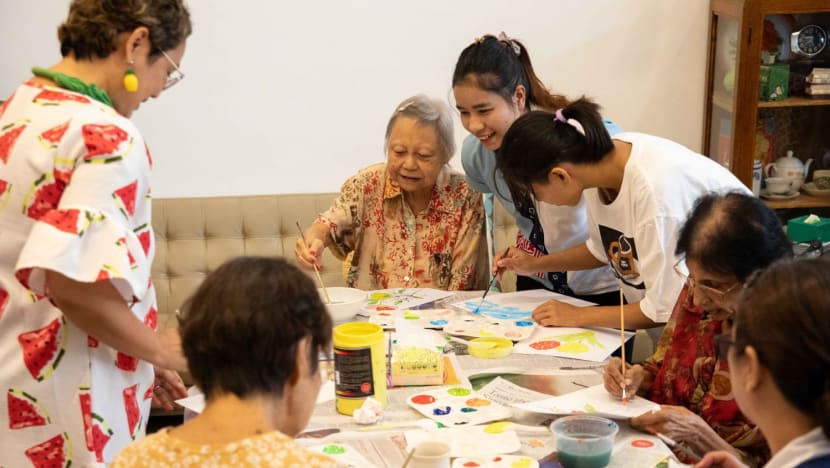
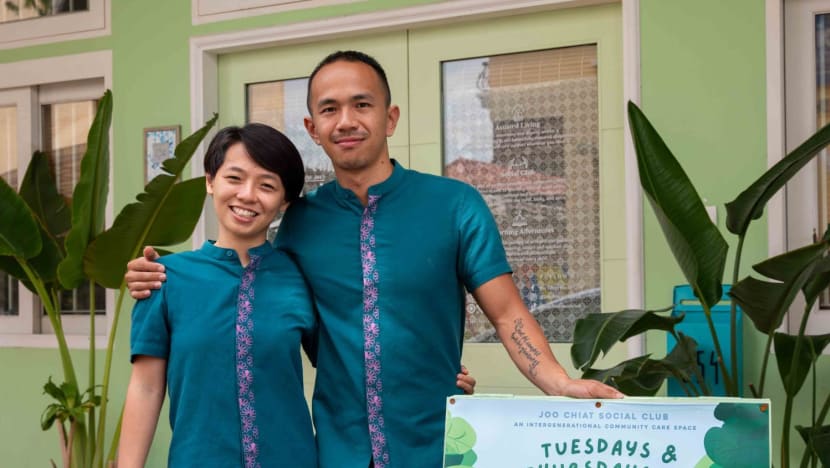
At My First Skool in Taman Jurong, a group of children from Kindergarten 2 level who were spending time with some seniors listened attentively to a talk held by Ng Teng Fong General Hospital's staff members.
As they learnt about healthy foods, Madam Patsy Low, 72, gave a hint to some of the children about the answer to a worksheet — that wholemeal bread is healthier than a bowl of colourful cereal.
She then got worried that the answer might be wrong, but a kindergarten teacher told her that it was okay if there was a mistake. In this instance, of course, Mdm Low's hint was correct.
She also joined them in a song about healthy eating, clapping and encouraging the children to sing along as she sat among them on a table as short as a footstool.
As the session ended, a child hugged her before heading back to class, leaving Mdm Low glowing with pride.
"When I see the children are happy, I also feel happy. And they can spend time with us, so we don't feel so lonely," the retiree said. She has eight grandchildren and the youngest is now in secondary school.
"Some children are scared and they hide when they see a senior citizen... but because we see them often, they talk to us and that makes me happy, especially when they are so small and cute."
Two-year-old Loi Min Ern is one of these children taking part in these activities.
Her mother, Ms Chen Sher Li, 36, an administrative executive, said that because Min Ern does not live with her grandparents, the inter-generational activities are an opportunity for her to interact with seniors.
"Inter-generational activities help her understand different life stages, in addition to interacting with peers other than her age," Ms Chen said.
The programme is clearly working, the mother added, pointing to her child's obvious adoration for the seniors.
"Min Ern will sometimes imitate the actions of an older person and ask why do they walk very slowly," Ms Chen continued.
"She will also pretend to be an older person, saying things like, 'Help me, please'."
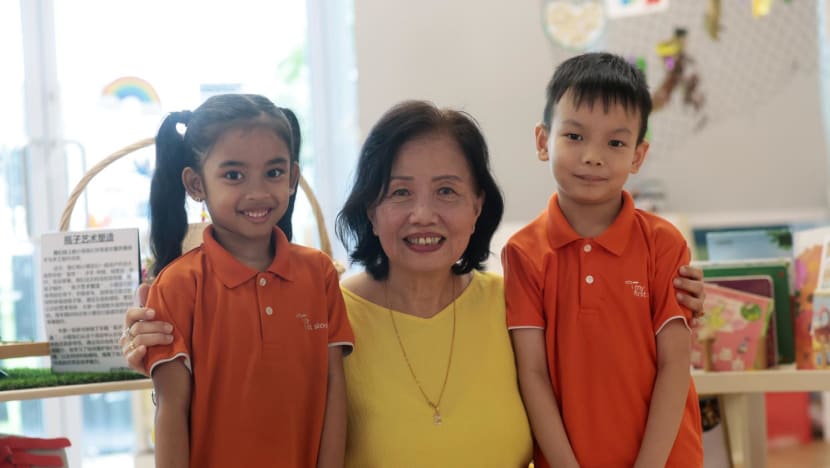
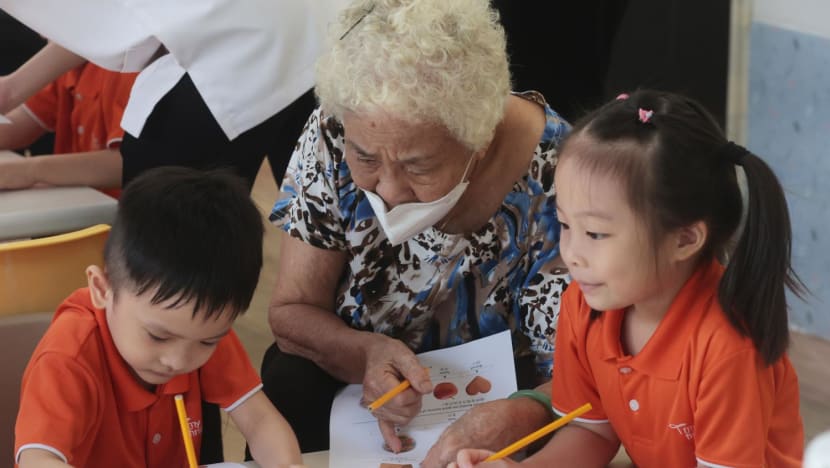
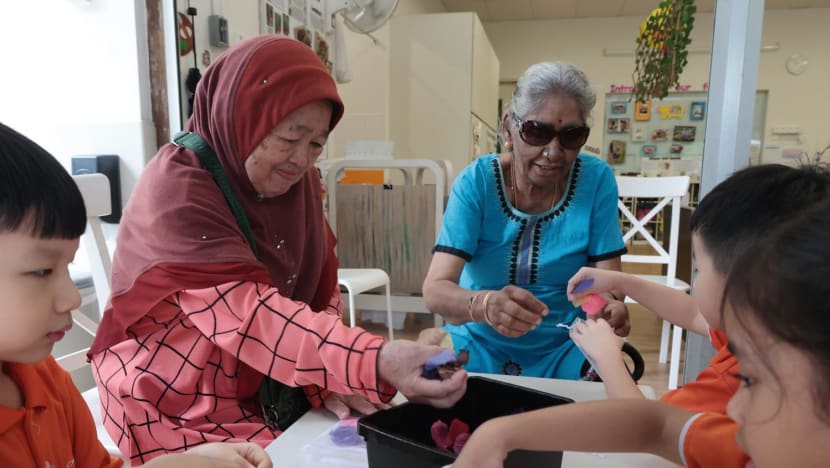
Ms Chan Su Yee, chief executive officer of NTUC First Campus and NTUC Health, said that the inter-generational activities have expanded to become more regular and structured.
The programme is available in all 160 My First Skool centres alongside most of the NTUC Health facilities, and takes place at least once a month.
"With regular interactions, we have observed that both seniors as well as preschoolers form long-term bonds," Ms Chan said.
"Over the years, we have witnessed improvements in seniors through the programme. For instance, seniors with conditions such as dementia and aphasia showed marked improvements in social interaction and engagement during the sessions."
Aphasia is a brain disorder where a person has trouble speaking or understanding other people speaking.
Ms Chan added that the seniors are motivated to spend time with the children — so much so that one of them had asked for a hearing aid so that he could attend a reading session for a child.
"Inter-generational efforts are all about bringing the community closer, which goes beyond activities at eldercare centres and preschools."
Agreeing, Ms Chee of Joo Chiat Social Club said that the seniors also treat her as though she were their child, often telling her stories of their lives.
The centre organises daily activities involving arts and crafts, cooking and music, for example, that residents and senior citizens may take part by paying a fee. The volunteers there will occasionally take their children along to these events.
That, Ms Chee said, is when "organic interactions" between the seniors and children take place. One senior often makes a trip to a nearby supermarket to buy snacks. Others tease the children or read them books.
While she and her husband hope to further their dream of turning the space into an inter-generational village, they face space constraints in their Joo Chiat shophouse.
"With a lot of kids, it can get a bit chaotic," she admitted. "We hope one day to have a bigger facility that could facilitate more seniors to bond with other generations."
It is not just the young children bonding with seniors. Some programmes, such as Wehiro's ageing simulation programme, allow young persons to sneak a peek into what it is like to age in Singapore.
This includes experiencing what it is like to have dementia by wearing physical restraints or going through a scheduled timetable at a nursing home.
Seniors from active ageing centres and eldercare homes also share their experiences with the youth as part of the programme.
Ms Sim Rou Cheng, chief executive officer of Wehiro, said: "We find that it motivates the youth to care more for the elders after stepping into their shoes.
"Participants shift from pitying the elders, having perceptions that they are weak and cranky for little reason, for example, to empathising with them and understanding their behaviour, their struggles and their stories."
Ms Sim added that more than 5,800 young people have taken part in the simulator programme since it started in 2017.
CULTIVATING UNDERSTANDING
Inter-generational activities are becoming more commonplace globally in ageing societies. And as the years go on, experts such as Dr Carol Ma said that these activities benefit both seniors and youth alike.
Dr Ma, the head of gerontology programmes at the Singapore University of Social Sciences, added that such programmes are especially important in Singapore, where the population is ageing and there are more single-person households.
"Positive bonding relationships can also promote the health and well-being of both generations and community integration," she explained.
For seniors, such programmes not only give them purpose by sharing their wisdom and experiences, they also address loneliness and allow them to learn the perspectives of today's younger generation.
Children and youth also get to understand the ageing process, learn from the seniors' life experiences and develop a sense of responsibility to care for elders in the community.
"Moving towards inter-generational bonding activities not only enhances social cohesion but also promotes mutual understanding and support across different age groups, ultimately benefitting the entire community," she added.
So how should these programmes be shaped to benefit everyone? Dr Ma pointed to a guide by the government-linked Agency for Integrated Care that provides potential activities for inter-generational interactions.
This includes getting seniors and children to learn about good hygiene practices together, or getting the seniors to teach children how to play traditional games such as chapteh (a game of keeping a feathered shuttlecock in the air by kicking it with a foot) and five stones (a game involving small triangular bean-filled bags played in various formations).
Dr Ma said: "We should continue to create more programmes to educate and inspire young people to understand the needs of older adults, while also motivating older adults to share their life experiences with the younger generation."









